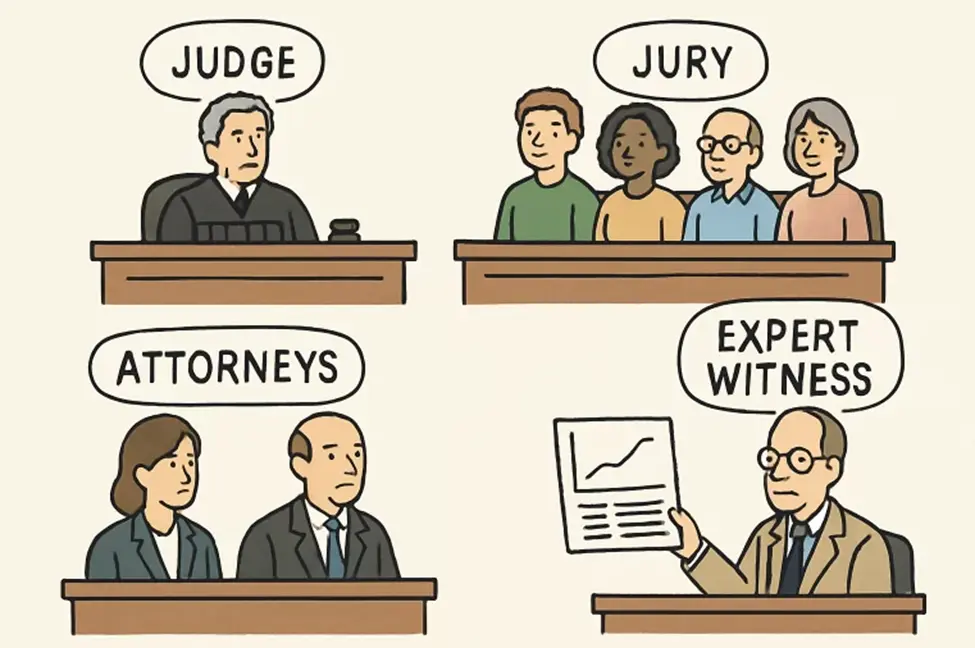Navigating the complexities of modern litigation often demands more than just a keen legal mind—a nuanced understanding of technical, scientific, or specialized topics is increasingly critical for achieving fair outcomes. In today’s intricate legal environment, expert witness services have become essential for helping judges, juries, and attorneys interpret multifaceted evidence and reach informed, balanced conclusions. Expert witnesses are crucial in bridging the gap between complex legal cases and practical decisions. They provide technical insights, interpret data, and translate specialized jargon into accessible language. Legal professionals must adopt best practices for selecting and using reliable expert witnesses in challenging disputes, as consistent vetting processes and staying updated can enhance cases and elevate standards in the modern legal system.
The Role of Expert Witnesses in Legal Cases
Expert witnesses play a crucial role in the legal system by interpreting and educating legal professionals and laypeople in litigation. They interpret raw data, evaluate complex materials, and translate specialized concepts into actionable insights. Their detailed analysis, well-reasoned opinions, and compelling testimony under oath empower legal teams to build strong, evidence-based strategies, impacting the quality and fairness of outcomes in court. Expert witnesses are essential in engineering failures, financial fraud, medical malpractice, intellectual property disputes, toxic torts, product liability, and environmental litigation. Their ability to convey sophisticated ideas in an accessible manner is crucial for ensuring reliable, objective, and understandable evidence, often determining a case’s success or failure in court.
The Importance of Vetting Expert Witnesses
Properly vetting expert witnesses is crucial for maintaining the integrity of legal proceedings and upholding the credibility of a case. A significant portion of an expert’s effectiveness and persuasiveness hinges on their professional background, reputation, and prior testimony history. Opposing counsel routinely scrutinizes an expert’s qualifications and the substance of their opinions, probing for inconsistencies or prior misrepresentations. Such vulnerabilities can undermine the strength of an expert’s testimony or even lead to outright disqualification, jeopardizing the case’s outcome. As The National Law Review emphasized, exhaustive due diligence has become an expected and essential part of legal practice rather than a mere best practice. Vetting strategies involve thoroughly evaluating an expert’s academic and professional credentials, industry reputation, published articles, affiliations, court testimony, and feedback from previous attorneys. Inconsistent or contradictory testimony, lack of relevant experience, bias, or conflicts of interest should prompt further investigation. Legal teams should withdraw or replace experts who don’t meet high-reliability standards.
Technological Advancements in Expert Testimony
The digital age has significantly transformed expert witness services. Technology now allows top experts to contribute from anywhere, broadening access, improving scheduling, and ensuring attorneys secure the most qualified voices for their case. Technology has also changed the delivery and understanding of expert testimony, with interactive digital exhibits, high-resolution forensic visualizations, and computer-generated simulations presenting technical evidence in compelling ways. Artificial intelligence and advanced data analytics have enhanced expert reliability, speed, and impact, fundamentally changing evidence digestion in courtrooms. Remote testimony has also changed logistics, allowing experts to attend hearings, depositions, and trials without extensive travel, increasing efficiency and accessibility for legal teams and the court. This shift reduces delays and democratizes access to authoritative testimony across the legal system.
Emerging Trends in Expert Witness Services
As litigation becomes more complex, expert witness services evolve rapidly, shaped by new specialization, communication, and interdisciplinary insight expectations. Specialization is increasingly sought, allowing attorneys and courts to navigate complex issues. Interdisciplinary expertise is also becoming increasingly sought, as legal cases often intersect multiple fields like engineering, health science, finance, and technology. Successful expert witnesses must possess technical expertise and superior communication skills to distill complex material into concise explanations. These trends drive the evolution of expert witness services, raising recruitment, training, and professional development standards to ensure expert testimony remains relevant and authoritative in fast-changing legal environments.
Best Practices for Engaging Expert Witnesses
To maximize the value of expert witness testimony, attorneys should implement best practices throughout the engagement process. These include early involvement, comprehensive vetting, clear communication, and ongoing collaboration. Early engagement allows for a thorough case review, robust analysis of evidence, and comprehensive preparation. Comprehensive vetting involves examining each expert’s credentials, experience, reputation, published work, and previous court performance. Selecting expert witnesses who excel in their technical field and communicate effectively with non-expert audiences enhances their persuasiveness. Fostering a dynamic relationship between the legal team and expert witness allows for pivoting strategies as new developments arise. By prioritizing these best practices, attorneys can maximize the impact of expert witness testimony, ensuring they provide critical knowledge and serve as active partners in achieving successful outcomes in challenging litigation.
Conclusion
The expanding role of expert witnesses in today’s legal environment cannot be overstated. In high-stakes cases, their clear, objective breakdown of technical issues often makes or breaks a legal argument. Expert witness services, diligent vetting, the latest technology, and close attention to emerging trends are powerful catalysts for informed, fair, and balanced outcomes. For anyone involved in legal proceedings, embracing these pivotal services is advantageous and indispensable to achieving justice today.
Also Read-Harnessing Technology for Efficient Home Management


